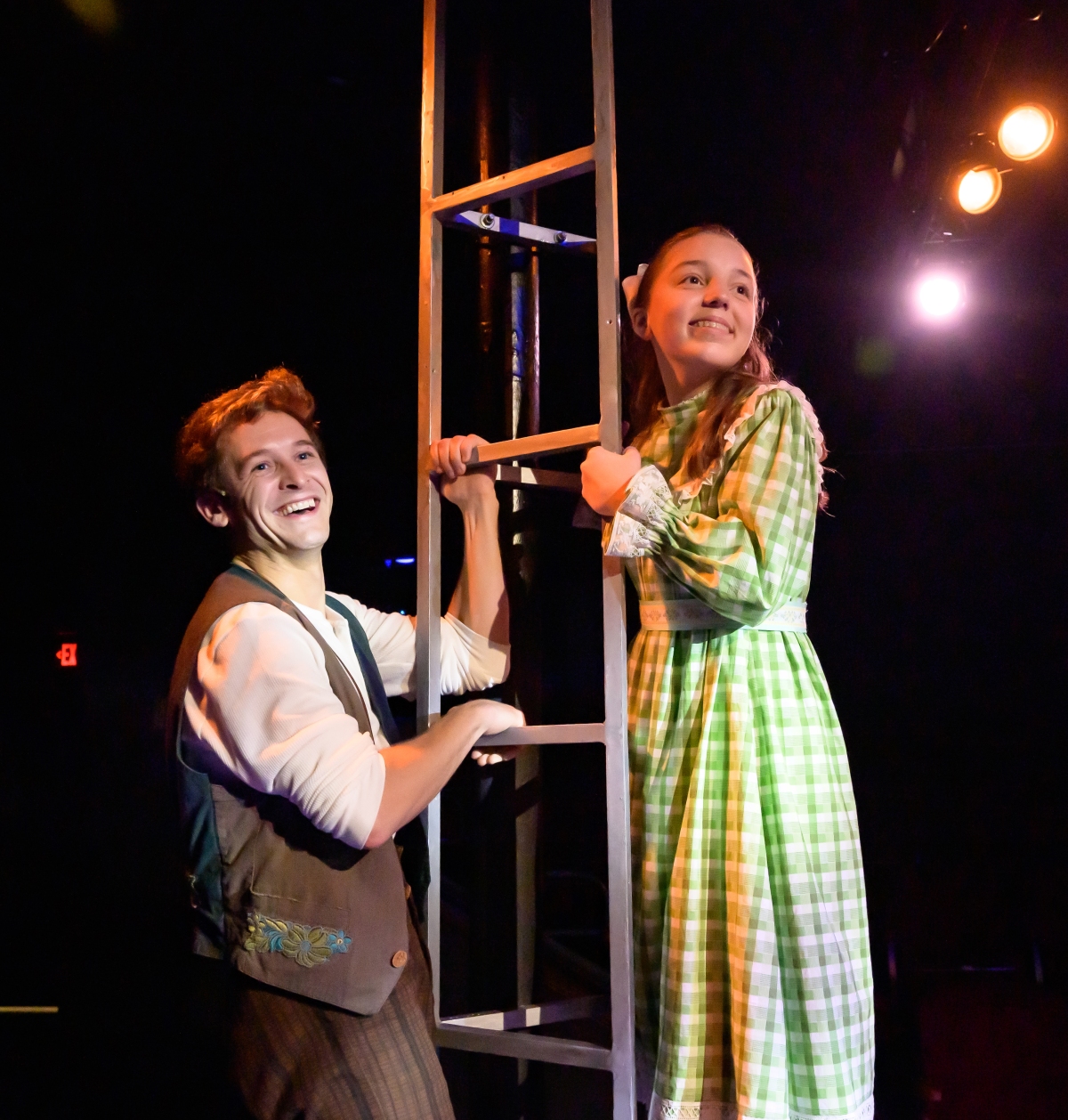TUCK EVERLASTING: It’s a Family Affair
A Theater Review by Julinda D. Lewis
At: Virginia Rep’s Children’s Theatre at Willow Lawn; 1601 Willow Lawn Drive, RVA 23230
Performances: October 18-December 1, 2019
Ticket Prices: $21
Info: (804) 282-2620 or virginiarep.org
Virginia Rep opened is 2019-2020 Children’s Theatre season with a magical foray into the world of Tuck Everlasting. The musical, based on Natalie Babbitt’s children’s novel about a family that finds immortality in the waters of a remote spring in the New Hampshire countryside and the grieving young girl who befriends them, was performed on Broadway in 2016. Virginia Rep shared this co-world premiere of this Theater for Young Audiences (TYA) Edition with Nashville Children’s Theatre. (The Nashville premiere was actually in September 2018, so I don’t quite understand how that makes this a co-world premiere.) Pushing that question aside, Tuck Everlasting is a beautifully conceived play that thoughtfully poses serious questions about life choices while resonating with audiences of all ages. The story was new to me, as I had not read the book, had not seen previous productions of the play, and had not seen either the 1981 film by One Pass Media or the 2002 Disney film. Now, I cannot imagine how I missed out.
Unlike many Children’s Theater productions that seem geared towards the youngest audience members from around 4 to 10, Tuck Everlasting is a bit more sophisticated, and seems most appropriate for pre-teens through adults. This is also a production you can feel confident in attending without a child, although I recommend you bring along at least one. Part of the joy of Tuck Everlasting is watching the faces of the young audience members. My minor cohort on opening night was Nicole, just two days from turning 11, the same age as our story’s protagonist. For most of the show, which runs about 75 minutes, with no intermission, Nicole sat wide-eyed, on the edge of her seat. Just what held her attention – and mine? I’m glad you asked.
Lucy Caudle, a ninth-grader at Maggie Walker Governors School who was recently seen as Alexa in the Virginia Rep production of Atlantis, took full ownership of the lead role as 11-year-old Winnie Foster. Winnie’s father died less than a year ago, and her conventional mother demands that she wear mourning clothes for a full year. But Winnie has gotten wind of an itinerant fair coming to their small New Hampshire town of Treegap, and she wants to go. Caudle genuinely captures the longing and frustration of her character in musical numbers like “Live Like This” and “Good Girl Winnie Foster,” but also in her face and posture. She frequently looks upward and outward into the future or stands with her weight on the balls of her feet, ready to sprint off on the next long-awaited adventure.
It is her need for adventure that sends her off into the nearby woods – woods owned by her family – where she meets Jesse Tuck, younger son of the mysterious and reclusive Tuck family. Taylor Witt, a DC-based actor new to the Virginia Rep stage, makes a charming Jesse, the free-spirited younger brother who exasperates both his older brother Miles and his parents Mae and Angus. Witt emanates non-stop energy and even on opening night seemed to strike just the right chemistry with Caudle.
Todd Patterson is Miles, the older brother who is the voice of reason, but with a dark secret. In a touching scene, Miles finally reveals the source of his deep-seated anger to Winnie. Patterson does a marvelous job balancing the layers of his character’s personality and the reveal is skillfully timed.
Casey Daniel Payne, also making her Virginia Rep debut, added a bit of humor as Mae Tuck. She had grown resigned to her fate and the years have taught her to take pleasure in the small things like not having to keep a clean house, because no one comes to visit. I took particular notice of Walter Riddle as Agnus, the head of the Tuck household. Having kept his family safely secluded for more than 80 years, Agnus appears unruffled by impending disaster and spends his free time fishing. Riddle appeared natural and easy in the role of the father figure, reluctantly dispensing words of wisdom to Winnie and treating Mae with respect and affection that seemed somewhat startling for the time period, the late nineteenth century. It seemed perfectly natural when, sitting back to back with their fishing rods in hand, Winnie leaned her head on Agnus’ shoulder. She was missing her father, and he was remembering what it was like to hold a real child.
Dan Cimo was both sinister and hilarious as the “Man in the Yellow Suit,” a carnival barker who had heard of the magical water that granted eternal life and hoped to become rich from bottling and selling it. One of the most memorable lines in the play was delivered by Winnie’s mother, who asked where one would find a suit in that color, and having found it, why would one buy it? Lisa Kotula played the role of Winnie’s mother with both firmness and compassion. Her role required her to wear Victorian widow’s weeds – a plain black dress – the entire play.
The cast was rounded out by Jon Cobb as the bumbling Constable and Harrison Gray as his deputy, Hugo. Hugo also has a surprise to reveal in the final scenes. All were ably directed by Matt Polson, who kept the ensemble moving at a swift but manageable pace. The cast was also in charge of scene changes, which consisted mostly of moving a bench, a trunk, a gate, and numerous trees in a heavily forested but uncluttered set designed by Tennessee Dixon, enhanced by BJ Wilkinson’s lighting. The floor was painted with leaves, and larger leaves were projected onto them. A portion of a cottage façade and doorway was the most stable structure – or suggestion of a structure – and there was a grotto of trees surrounding a pile of rocks or boulders that sheltered the magical spring waters. Early on, Winnie pulled a small toad – her only friend at that time – from her pocket; later we saw a somewhat larger, animated toad (a hologram, perhaps?) projected onto the rocks. This toad plays an important part in Winnie’s decision on whether to drink the magical waters.
Set in a small New Hampshire town (it did seem odd that the Tuck family moved east, rather than westward) beginning August 1, 1893, Tuck Everlasting is clothed in period costumes, right down to the shoes, yet the story, the language, and the ideas remain relevant. Ruth Hedberg’s period costumes are whimsical, but she gives full reign to her creativity with the colorful costumes of the carnival people, including a strong man, a physic, clowns, and more. Mallory Keene’s choreography is not so much dance as rhythmic movement sequences organically incorporated into the actors’ actions and characterizations. All of the movement was guided by Jason Marks’ musical direction.
Tuck Everlasting was written by Claudia Shear and Tim Federle, with music by Chris Miller and lyrics by Nathan Tysen. The musical orchestrations are by John Clancy, with vocal arrangements by Chris Miller and ballet music arranged by David Chase. The musical selections were catchy and clearly delivered, from the different perspectives of longing, loss, and hopefulness of the opening “Live Like This,” sung by Winnie, Mae, Miles, Jesse, and the Man in the Yellow Suit to Winnie singing about how some days she wanted to “raise a little more than heaven,” to Hugo and the Constable’s pun-filled, “You Can’t Trust a Man in a Yellow Suit.” (Hugo accused the Man in the Yellow Suit of “fabricating” and the Constable interprets it as “fabric hating.”)
While all of this is going on, the audience, both young and old, is challenged with some real-life challenges: Don’t be afraid of death; it’s part of life. One path can lead to two different conclusions. Sometimes loving someone means letting them go. What are the positives and negatives of living forever? The one point my young cohort found confusing was the final scene, where we find out what Winnie decided to do with the double edged sword of eternal life – the vial of magical water that Jesse presses into her hand as a parting gift. The scene, and the entire play, offers an entry into discussing difficult and challenging topics with your children. Tuck Everlasting is a play that should be seen by families and discussed later.
NOTE: The Tuck family includes one black parent and one white parent, one white son and one black son. This is truly color blind casting, as the issue of race is never once mentioned.
Sensory Friendly Performances
Virginia Rep offers sensory friendly performances for children with autism and other
sensory or social disabilities. During these select performances, changes will be made in
lighting, sound, seating arrangements, and length of performance to create a more welcoming environment for this audience. A Sensory Friendly performance will be offered at 10:30 a.m. on Saturday, November 16. Please see the website for more details:
http://va-rep.org/sensory_friendly.html
Audio Described Performances
In collaboration with Virginia Voice, Virginia Rep offers Audio Described
performances, in which actions, expressions and gestures are described during gaps between dialogue throughout the performance for patrons with low vision or blindness. In addition to live audio description during performances, patrons are also invited to participate in a tactile tour before the performance. An Audio Described performance will be offered at 2:00 p.m. on Sunday, November 3. Please see the website for more details: https://va-rep.org/access_for_the_blind.html
Community Tickets Grant
Virginia Rep offers a free Community Tickets Grant for nonprofit organizations. Organizations who have a demonstrated need for complimentary tickets are encouraged to fill out the application found on the website: bit.ly/CommunityTix
Performance Schedule
Evening performances at 7:00 p.m. on select Fridays
Matinee performances at 2:00 p.m. every Saturday and Sunday
Matinee performances at 10:30 a.m. on select Saturdays
Julinda D. Lewis is a dancer, teacher, and writer who was born in Brooklyn, NY and now lives in Eastern Henrico County.
———-
Photo Credits: Aaron Sutten











One thought on “TUCK EVERLASTING: Don’t Be Afraid of Being Truly Alive”